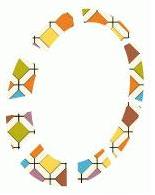Reconstituting capitalism

I was answering a question regarding group cohesion when the thought struck me that this is the core of our current problems with 'capitalism':
"The essence of capitalism is co-operation, not competition". People create artifacts, men-made tools and products. This we call capital because it is being owned by a person, a head, in Latin: capus. Head is also the name of the leader. And here the confusion started. Capital is being attributed to the head, the chief and vice versa, the one with most of the 'capital', is the most important person. This is the
Lucifer principle at work, a principle that is in our genes, our behaviour and our mind. As this principle has been devloped during aeons of scarcity, we have problems to see that it doesn't fit anymore in a situation of abundance. The thought that capitalism is about competion, is not only a cover-up, it is a trap.
It is a trap? Why? Competition is how we experience Howard's fifth global brain principle - the principle that is not a principle, but the manifestation of the other four principles - in the light of the Lucifer. The four principles that make up a social learning network interact. In the flickering light of the flame we read the writings on the wall and thought we understood: competition brings the best value for the lowest price. But with the search light of our mind we can see what was written there too:
"Cooperation works better and cooperative competition delivers more."
This, in my view, explains for instance the global success of cricket, footbal, soccer (the name is derived from co-operating), basebal, basketball, speed skating (ok, only in 'Dutchland') at the beginning of the twentieth century. The Olympic Games were rekindled in the high days of capitalism: it is more important to join than to win. This explains our new temples: stadions, where sports learn us how we can be co-operating while competing. We've been taming the Lucifer Principle by making it into a spectacle. Here is why our new gods are sport(wo)men: they carry the flames of our desires, our passions. Read why our new gospel are the tabloids with sportsnews. Bread and games is what defines humans. We should now start to apply these principles to our capitalism too:
capitalism is a sport between teams that improves all of us.
We can also see this in the global economy: the better a country co-operates, the more it prospers. On the short run, a nation will gain from the co-operation with a larger union. When this is being perceived as competition, competing for scarce resources, the union will run into trouble. But the growth of this single nation is not the result of competition, it is the outcome or co-operation. You can look though these glasses to the EU now. When partners keep competiting inside a union (and they do not start a war against another union, which was the usual solution) the union will suffer. The moment the union can be reconstituted on co-operating, and that is inevitable when it doesn't break up, nor it cannot go to war, the whole union will start to prosper again.
So we have to change the meme of capitalism from competition into co-operation.
Capitalism is fundamentally build on co-operation. The bedrock of a culture is co-operation. Jericho was build on co-operating, the Parthenon was, the gothic cathedrals were, Amsterdam, New York and Shanghai are. Can you mention one society that was not build on co-operation and has existed for longer than one generation? And if it existed, would you emigrate to that society? The meme that Plato, Marx and others who were led astray, all for their own reasons, have been exploiting is that competition is what brings us 'goods'. The whisper of Lucifer. This competition meme should be banned from our heads, not only because it doesn't deliver, but because it creates the very facts it says it doesn't: bad quality, high prices, corrupted leaders, poverty leading to suffering, tyranny and war. We do not need another -ism, we need to rethink again.
I propose to make a
declaration of interdependence. Just like the founding fathers of the Dutch Republic did, and those of the French republic and the United States, and all the other states, who declared an end to a long period of abuse by their kings or oppressors by taking the right to oppose tyranny. We have the right and the obligation to reconstitute capitalism. We can make capitalism into what it was or what it intents to be: the secular salvation of human kind. This will not be a constitution that divides, but a constitution that unites. Capital will be the result of making commitments to each other, trust in each other, cooperation, and true and open communication. Capitalism shall deliver.
I can also see a relation with the paradoxes of scarcity / belonging, but will spell it out later.
As during the last few centuries we have been able to build these great societies under the regime of a bad meme, imagine what we can acheive if we start to write a new constitution for capitalism:
every person has the right to pursue his or hers own interest in the interest of humanity!
Beautiful concert
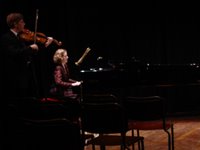
On Sunday pianist
Ulrike Nüßlein & violist
Theodor Nüßlein treated us with their interpretation of 'Sonata for Viola and Piano No. 2' by the featured composer
Octávio Vázquez’s. Octávio had had a change to meet with the players during rehearsal.
The music was written in 2002 and dedicated to violist Viacheslav Dinerchtein. In the Spring of 2003 it was one of the winning pieces at the Prokofiev International Competition in St. Petersburg.
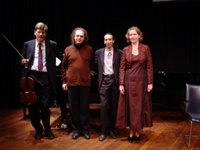
"
I have always felt, since its inception, that this piece has a strong connection with Anne Frank, and the events surrounding the last few years of her life. While the events were wide-spread in Europe, her perspective remains more particular" explained Octávio Vázquez, second from the left.
The fact that the attic were the Franks spend their days in hiding was just two blocks away from this concert hall, added to the intensity of the performance. It brough tears to the eyes of many of the listeners.
Some prelimenary conclusions
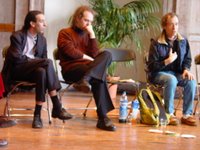 The global brain is alive
The global brain is alive and slowly, slowly becoming aware of ourself: we're on a mission to make this awareness real. That's why we used the slogan: 'be part of something bigger than yourself, something with real meaning'.
Reïnventing Capitalism is not something trivial, something easy, nor is it only having the right vision. Even when all of us agree, there still will be surprises, misunderstanding, power play, personal differences and discontentment. It is not enough to preach or sell the concepts. It has to be acted out, experienced determinism. This means hard work: research, search for meaning, dialogues, interactions. We'll have to put all the principles of the Global Brain at work: what rules should be maintained and which should be broken? And how? What diversity do we need and what is just new for newness-sake? And why? Which paths look good but are deceiving and which are small, dark, but will lead to our intended result? And how and were do we find the necessary resources? Attention - who said marketing?- perhaps being the most wanted.
During the meeting in Sunday some interesting questions were raised (and I please add your won questions or answers):
- Is having peace the same as having no violence? Or is violence part of nature and peace something else?
- Is the current situation regarding (Islamic) fundamentalism part of the problem or another issue? And if so, what is more important? And if not so, is 'reïnventing capitalism'the answer?
- What shit is being produced by the current version of capitalism? And who is feeding on it?
- Is 'Reïnventing Capitalism' just a new cover-up for 'Pax Americana'?
- Is education the only way out, because it looks a bit like a 'Von Münchhausen solution': pulling yourself out of the swamp by your own hair? Are the current adult the ones who are going to do the education?
- We want more unity, but at the same time want more individual development, freedom and choice. How do we solve this riddle?
- What practical solutions to support emergent change do we have?
- Music seems to offer a way out, as musicians and artists have a role in translating feelings, moods into words and actions for whole generations. Are they silent, being silenced or are we not paying enough attention? Will the old recipes for music making still work?
- What role do we have for science?
First pictures from the conference
Later more...
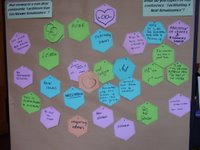
Expectations of some of the participants of the conference. Participants were asked their expectation about this conference. On the hand to give us an idea of their ideas, on the other hand to help them focussing on why they came and support them in acheiving their goal. That's were this venture is all about: doing your work better, from your hearth, with your passion!
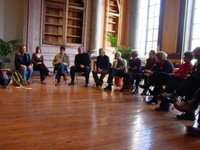
Having a conversation with Howard on Sunday morning.
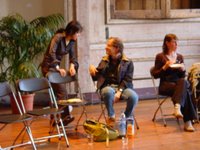
During the lunch break, there were several conversations in small groups.

Howard and some participants in the Foyer.
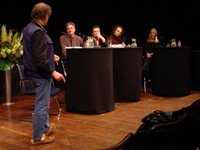
The panel'The role of the artist in society', with Marcel Roele, Jamer Martin, Octavio and Ruta.
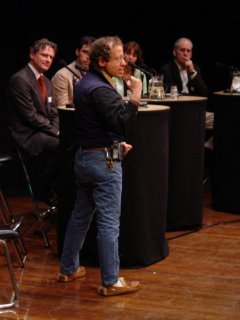
Here are some picture shot at the conference on Saturday. This one is from the second panel discussion were Howard is expressing what he thinks about the subject. In the background: Marcel Roele and three business people from the audience who volunteered to be in this 'Business-panel'.
In the picture on the right, Edgar is introducing professor Magala, who inspired us with his views on facilitation and translation regarding the new renaissance.
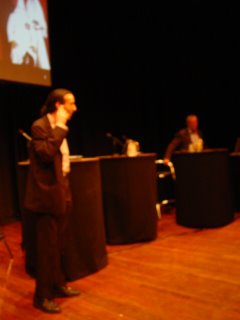
Faciltated systems battle for more soul too
In http://facilitatedsystems.com/weblog/2006/03/more-on-growth.html Bill Harris writes:
"When I was growing up, I had the impression that companies existed to provide goods and services for customers. I'm sure I was quite naive. I knew there was competition, but it seemed sufficient for most companies I encountered to do a good job at what they did; they didn't also have to grow at a constant CAGR to be successful." ..." Today, more and more are saying we've reached or exceeded the capacity of the earth to sustain society; perhaps these times call for a vastly different approach." and "Perhaps if we grew when (and because) we had a real contribution rather than because growth is expected, we'd be more likely to create a sustainable future for ourselves and our descendents."
In http://facilitatedsystems.com/weblog/2006/02/battle-for-soul-of-capitalism.html he also discusses John Bogle's book.
Thanks for the suggestions Bill.
Visual overview of working conference

Here is a visual overview of the conference. The bottom shows the panel and workshop sessions in 5 streams, the upper part is the plenary meeting. Inbetween are the four keynote. Our aim is to support you in developing a meaningful action plan.
Click here for an animation (explorer only):
Animated NextRenaissance or to download a PowerPoint presentation:
Animated NextRenaissance PowerPoint
"What we really want is to contribute to something bigger than ourselves.... something with real meaning"
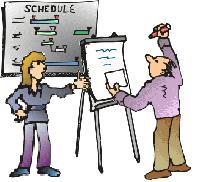
With this quote, Barbara Annis, CEO of a consulting firm based in Canada, prompted Howard to first work on 'Reïnventing Capitalism'. He had better called his book
'Reïnventing meaning'. Walter Freeman - autor of 'How BRAINS make up their MINDS' - states:
'A fundamental and enduring human activity is the search for meaning'. But, here is the catch, we cannot define meaning. We can talk about meaning, as we're doing now, but like the definition of time:
you know what I mean by meaning, but you can never define what it is.
Meaning is unique for each and every person. Meaning emerges from each and every situation. We're craving for meaning, we create - and destroy - meaning. Meaning is all there is, from the moment we receive our name to the tombstone on our grave. Meaning is nameing written differently.
People seek meaningful relations. On the surface, you think 'what's in a name?' But under the sureface, you do not want superficial relations. You want to know:
'what's in in for me?'. You've perhaps been told that you should look for value for money. You know differently. 'What's in it for me' is about relations. You, I, we need deep relations. We start to create meaning, we shape meaning, we're in the business of
relationships. In fact, meaning 'is' the relationships. This explains why a definition would end - 'fini' - a relation. That's why in this conference, relations are core activities.
The medium is the message and mine is the meaning. Meaning consists both of content, the message, the words, the wink of an eye and relationships. In fact, the relation is shaped by the meaning. The content is a disctinction between background and foreground, something like the black letters on the white of this screen. The relationship is a distinction between the context and the interpretant, something like the difference between you and me. Meaning emerges from the distinction of distinctions. That is why
'status' is so important for bacteria, plants, animals and people. 'Status' signifies the meaning of the relation, it shapes the relation, it 'is' relationship.
Our small conferences 'Facilitating a new Renaissance' - are about contributing something to yourself:
reinventing meaning to your work. We aim to explore the big questions of our society. Not by telling what they are, but by listening to each other. Then we'll vote ('having a say differs from having a vote' - Max DePree) over the issues and start searching for feasible solutions. Then we're going to ask YOU to make a contribution to what we all think is a feasible solution of an important problem now. We're offering you a way to make a renaissance happen. It has been done before.
Reverse engineering our future

While talking about the conferences (yes, we've created two conferences with the same programm, but with different contents, in one weekend) and its design the remark was made that what Dutch people are good at, is
reverse engineering. We're not that great in new and innovating ideas, we're not into 'Knowledge Management', but we're specialised in
using ideas from others, taking them apart and reassemble them into better and improved, workable entities. We did this in our 'Golden Age', with inventing the multi-national, a wooden shoe copy from the Italians, going to sea like the Portugees, copying colonisation from the Spanish; we did it in the oil industry, Shell is like Standard Oil; in lamps, Philips outsmarted Edison's invention and in butter and washing powder: Unilever. Our speciality is trading,
resource shifting, because we're located at the delta of three big rivers.
So, this conference is just a quick redesign of over ten billion years of evolution. And, now I mention it, we didn't write the book 'Global Brain' either. Never again give a Dutchman your trade secrets!
New bridges

Talk about synchronicity. This morning I added the drawing with the bridge. In the afternoon I got a mail that one of our facilitators is unable to come; but he had already spoken to a friend, a possible replacement, Jan Visser. What does Jan Visser have on his website: bridges. What do you think? Should we engage him?
http://www.acompanyon.nl/home.html
Building new bridges

Human beings prefer building towers. Towers are statements of power, status. It is in our roots, like the tower of Babylon. This conference is NOT about building towers, it is about building bridges. Bridges between different groups, cultures, people. It is also about new ways of building bridges. That's why it is in Amsterdam: city of bridges.
(Visual by Michael Erickson, http://michael_erickson.tripod.com)
Securitas in dubio
Anais Nin, wrote "
We don't see the world as it is; we see it as we are.", says this short article
http://iaf-world.org/i4a/pages/index.cfm?pageid=3502#doubt by Sandor Shuman; It tells more relevant things for the conference:
I like to quote more:
"1. Each individual in a group has the potential to make a valuable contribution.
2. Some group members might have more valuable contributions to make than others—more expertise, greater insight, better judgment—on at least a few of the tasks at hand.
The problem is that we rarely know which individuals are more expert at which tasks. There is no objective way to distinguish between one good contribution and another to determine which is better, or to know how to combine individual contributions to produce results that are better than any of the individual contributions taken alone.
Although we often rely on one person to integrate the group's thinking, this may result in that person's views dominating all others— and that one person might not have it right. Alternatively, we can allow the group to decide how best to make use of the contributions of each of its members. This requires that we help (=
FACILITATE JL) group members learn from one another, so they can correct one another's errors, enabling—at least theoretically—the group to perform better than even its most capable member."
Crisis? What crisis?
We, the peoples of the world, are heading towards the middle of a crisis, a cross roads. Either we reïnvent ourselves and emerge as a new kind of men or we head down a cul de sac, a new dark age or into oblivion. In both cases it is the end of cultures as we know it. Fear not, it is not the end of times. Nature, this earth and life, will continu, no doubt. And after some period of time, intelligent beings, like us, will reappear. It is inevitable. It will just be a temporary set-back.
There is a 'window of opportunity', I think. We can make a short cut or use the energy of the crisis to create a new world, a new, partly virtual, species. When we pull together all good people, and apply a kind of reasoning that use the old rules - the rules that brought us progress with destruction and war - in new ways. I think we can find ways and means to progress without having to go to war. But we must be prepared to fight. This is what we're planning to test in the conference 'Facilitating a new Renaissance': giving birth to new ways of communication, collaboration, consensus and concordance.
Link to weblog of tsujan
Jan Gieszen will be one of the facilitators on the conference. You can find more information on his tsujan weblog. I've added the link here and in the Links section.
tsujan weblog
 I was answering a question regarding group cohesion when the thought struck me that this is the core of our current problems with 'capitalism': "The essence of capitalism is co-operation, not competition". People create artifacts, men-made tools and products. This we call capital because it is being owned by a person, a head, in Latin: capus. Head is also the name of the leader. And here the confusion started. Capital is being attributed to the head, the chief and vice versa, the one with most of the 'capital', is the most important person. This is the Lucifer principle at work, a principle that is in our genes, our behaviour and our mind. As this principle has been devloped during aeons of scarcity, we have problems to see that it doesn't fit anymore in a situation of abundance. The thought that capitalism is about competion, is not only a cover-up, it is a trap.
I was answering a question regarding group cohesion when the thought struck me that this is the core of our current problems with 'capitalism': "The essence of capitalism is co-operation, not competition". People create artifacts, men-made tools and products. This we call capital because it is being owned by a person, a head, in Latin: capus. Head is also the name of the leader. And here the confusion started. Capital is being attributed to the head, the chief and vice versa, the one with most of the 'capital', is the most important person. This is the Lucifer principle at work, a principle that is in our genes, our behaviour and our mind. As this principle has been devloped during aeons of scarcity, we have problems to see that it doesn't fit anymore in a situation of abundance. The thought that capitalism is about competion, is not only a cover-up, it is a trap.














